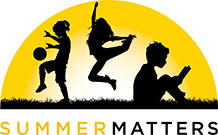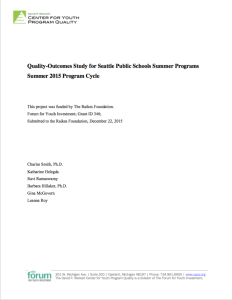Quality-Outcomes Study for Seattle Public Schools Summer Programs
A quality outcomes study on Seattle Public Schools summer programs conducted by Seattle Public Schools, the Raikes Foundation, School’s Out Washington, and the David P. Weikart Center for Youth Program Quality
A new study shows a clear link between the quality of summer learning programs and the academic outcomes they produce. The study was funded by the Raikes Foundation and done in partnership with Seattle Public Schools, the Weikart Center for Youth Program Quality, and School’s Out Washington. This is one of the first studies of its kind and demonstrates several important findings.
Quality Matters
Like early learning and K-12 education settings, the benefits youth receive from out-of-school time (OST) programs hinge on the quality of the program. Simply put, higher quality programs produce better academic outcomes.
Quality OST Programs Combat Summer Learning Loss
Most youth participating in the programs studied showed improved math and literacy skills during the summer. This stands in contrast to the proven learning loss students experience when not engaged in educational opportunities during the summer.
There’s Demand for Quality Summer Programs in Seattle
Seattle Public Schools summer programs were well attended and demonstrated high levels of quality compared to programs in other cities.
Since 2011, the Raikes Foundation in collaboration with School’s Out Washington has worked to improve the quality of out-of-school time programs serving youth in Washington State. During this time, they have partnered with organizations to establish a clear, measurable definition of quality, a continuous improvement process to help programs achieve quality, and professional development opportunities to empower front-line staff interacting with youth. More recently, the tools have been adapted to meet the specific needs of summer learning OST programs. In Washington, communities are already making deep investments in summer learning to improve academic outcomes, and even more summer programs will work to strengthen their quality in the future.
Given the promising results of this initial study, it is likely that the Foundation will deepen their learning this coming summer by using a control group to examine growth in matched peers as well as dig in more deeply to document the specific practices that high quality programs are using to support positive outcomes.



